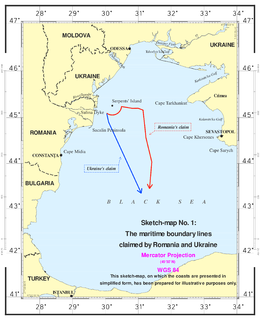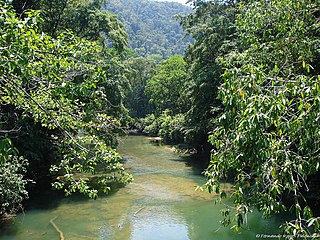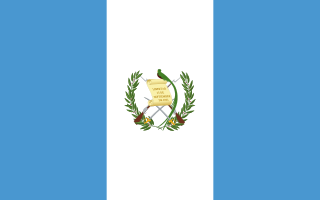
The Permanent Court of Arbitration (PCA) is an intergovernmental organization located at The Hague in the Netherlands. The PCA is not a court in the traditional sense but provides services of arbitral tribunal to resolve disputes that arise out of international agreements between member states, international organizations or private parties. The cases span a range of legal issues involving territorial and maritime boundaries, sovereignty, human rights, international investment, and international and regional trade. The PCA is constituted through two separate multilateral conventions with a combined membership of 121 states. The organization is not a United Nations agency, but the PCA is an official United Nations Observer.

The Supreme Tribunal of Justice is the highest court of law in the Bolivarian Republic of Venezuela and is the head of the judicial branch. As the independence of the Venezuelan judiciary under the regime of Nicolas Maduro is questioned, there have recently been many disputes to whether this court is legitimate.

The International Court of Justice Advisory Opinion on Western Sahara was a 1975 advisory, non-binding opinion by the International Court of Justice (ICJ) of two questions presented to it by the UN General Assembly under Resolution 3292 regarding the disputed territory of Western Sahara. In 1969, Spain returned the region of Ifni to Morocco.

Stephen Myron Schwebel, is an American jurist, counsel and independent arbitrator. He serves as Judge of the World Bank Administrative Tribunal and as a member of the U.S. national group at the Permanent Court of Arbitration. Previously, he served as President of the World Bank Administrative Tribunal, as President of the International Monetary Fund Administrative Tribunal (1993–2010), as President of the International Court of Justice (1997–2000), as Vice President of the International Court of Justice (1994–1997) and as Judge of the International Court of Justice (1981–2000). Prior to his tenure on the World Court, Judge Schwebel served as Deputy Legal Adviser to the U.S. Department of State (1974–1981) and as Assistant Legal Adviser to the U.S. Dept. of State (1961–1967). He also served as a professor of law at Harvard Law School (1959–1961) and Johns Hopkins University (1967–1981). Judge Schwebel is noted for his expansive opinions in momentous cases such as Legality of the Threat or Use of Nuclear Weapons, Military and Paramilitary Activities in and Against Nicaragua and Oil Platforms .

International law is the set of rules generally regarded and accepted in relations between nations. It serves as a framework for the practice of stable and organized international relations. International law differs from state-based legal systems in that it is primarily applicable to countries rather than to individual citizens. National law may become international law when treaties permit national jurisdiction to supranational tribunals such as the European Court of Human Rights or the International Criminal Court. Treaties such as the Geneva Conventions may require national law to conform to respective parts.
Territorial disputes of Nicaragua include the territorial dispute with Colombia over the Archipelago de San Andres y Providencia and Quita Sueno Bank. Nicaragua also has a maritime boundary dispute with Honduras in the Caribbean Sea and a boundary dispute over the Rio San Juan with Costa Rica.

Colombia–Nicaragua relations entail the diplomatic relations between the Republic of Colombia and the Republic of Nicaragua. The relationship between the two Hispanic American countries has evolved amid conflicts over the San Andrés y Providencia Islands located in the Caribbean sea close to the Nicaraguan shoreline and the maritime boundaries covering 150,000 km² that included the islands of San Andrés, Providencia and Santa Catalina and the banks of Roncador, Serrana, Serranilla and Quitasueño as well as the 82nd meridian west which Colombia claims as a border but which the International Court has sided with Nicaragua in disavowing. The archipelago has been under Colombian control since 1931 when a treaty was signed during US occupation of Nicaragua, giving Colombia control over the islands.

The Case concerning maritime delimitation in the Black Sea [2009] ICJ 3 was a decision of the International Court of Justice (ICJ). On September 16, 2004, Romania brought its case to the court after unsuccessful bilateral negotiations. On February 3, 2009, the court handed down its verdict, establishing a maritime boundary including the continental shelf and exclusive economic zones for Romania and Ukraine.
James Richard Crawford, AC, SC, FBA is an Australian academic and practitioner in the field of public international law. He was elected as Judge of the International Court of Justice for a full term of 9 years in November 2014 and took his seat on the court in February 2015. From 1990 to 1992 Crawford was Dean of the Sydney Law School where he was also the Challis Professor of International Law from 1986 to 1992. From 1992 to 2014, he was Whewell Professor of International Law at the University of Cambridge and Fellow in Law at Jesus College, Cambridge. He was formerly Director of the Lauterpacht Centre for International Law, also at Cambridge.

General elections were held in Guatemala on 6 September 2015 to elect the President and Vice President, all 158 Congress deputies, all 20 deputies to the Central American Parliament, and mayors and councils for all 338 municipalities in the country.

Jimmy Morales is a Guatemalan politician, actor, screenwriter and director, who won the 2015 Guatemalan presidential election and has served as President of Guatemala since January 2016. He joined the National Convergence Front (FCN/Nation) party in 2013 and became its General Secretary. Prior to his entry into politics he was a comic actor.

A constitutional referendum was held in Bolivia on Sunday, 21 February 2016. The proposed constitutional amendments would have allowed the president and vice president to run for a third consecutive term under the 2009 Constitution. The referendum was voted down by a 51.3% majority.

The Ligitan and Sipadan dispute [2002] ICJ 3 was a territorial dispute between Indonesia and Malaysia over two islands in the Celebes Sea, namely Ligitan and Sipadan. The dispute began in 1969 and was largely resolved by the International Court of Justice (ICJ) in 2002, which opined that both of the islands belonged to Malaysia.

The 2016 Belize–Guatemala border standoff began when Belizean soldiers fatally shot a 13-year-old Guatemalan along the Sarstoon River, which marks Belize's southern border with Guatemala.
Julio René AlvaradoRuano was a fourteen-year-old Guatemalan male that was killed in the Belize–Guatemala adjacency zone during an armed confrontation between the Belize Defence Force, Belizean park rangers and Guatemalan farmers. The incident raised tensions between Belize and Guatemala, who have an ongoing border dispute since 1821. Belizean officials maintain that the Belize Defence Force acted in self-defence. However, the Guatemalan government claims the incident was a deliberate attack carried out by Belize's military. After the incident, the Organisation of American States agreed to investigate the death of Julio Alvarado at the request of both countries.
A referendum on the territorial dispute with Guatemala will be held in Belize on 10 April 2019. The purpose of the referendum is to ask the Belizeans if they agree that Guatemala and their country request the International Court of Justice to finally resolve the Belizean–Guatemalan territorial dispute, as part of a commitment signed in December 2008 between the two countries. Guatemala held the referendum on 15 April 2018, and as established in the previous agreements, Belize must organize its referendum six months after Guatemala has carried out its own. Guatemalan Vice President, Jafeth Cabrera, stated that Belize would hold their referendum in response in May 2018, but Belize released a statement denying this, stating rather that they will hold the referendum after the re-registration process has occurred to ensure an accurate and fair vote.

Movimiento Semilla is a political party in Guatemala.

Legal Consequences of the Separation of the Chagos Archipelago from Mauritius in 1965 is an advisory opinion issued by the International Court of Justice on the Chagos Archipelago sovereignty dispute in response to a request from United Nations General Assembly. The Court deemed the United Kingdom's separation of the Chagos Islands from the rest of Mauritius in 1965, when both were colonial territories, to be unlawful and found that the United Kingdom is obliged to end "its administration of the Chagos Islands as rapidly as possible."
















